Foodgularity - Meat and synthetic food, plentiful and free
Some time ago my friend Jose Luis Cordeiro told me: You are nobody if you don't create a new concept. I invented the word "Energularity" to speak of Energy Singularity in anticipation of what could happen when Swanson's law caused solar energy to have a zero value.
Inspired by that idea and analyzing the progress that is taking place with artificial meat, hydroponic and aeronautical farms and nanotechnology I think we will soon see a new Singularity in meat generation, and in general in food: The Foodgularity.
It also seems that this concept is nonexistent in Google as of June 1,2017. I hope that from now on we will begin to talk about this.
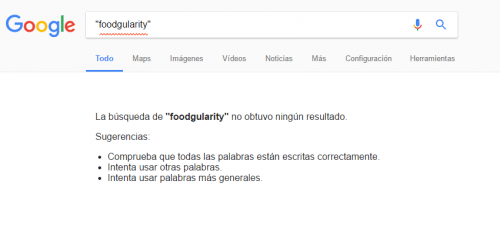
We are going to review the 3 main technologies that can lead us to Foodgularity, and of which I have already talked about a few times in lectures such as "Exponential Business Technologies", or articles such as Will physical assets be worth anything?
Synthetic, artificial or cultured meat*
This type of meat refers to research for the production of animal meat through an in vitro process that would avoid the slaughter of animals. Artificial or cultured meat, also known as in vitro meat, is animal meat that does not come directly from the body of an animal (as a muscular organ has never been part of an animal); it comes from the cultivation of muscle cells previously extracted from animals. You can see more about the history of cultured meat in Wikipedia.
On August 5,2013, the first hamburger manufactured in a laboratory was presented to the press. Its architect, researcher Mark Post, from the University of Maastricht, proposed to create meat using an alternative method to current production systems, which are very environmentally unsustainable.
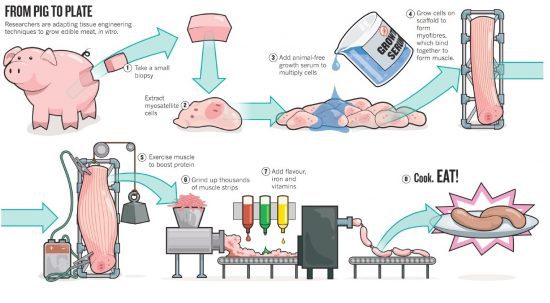
If we take as a reference the traditional burgers created from animal muscle, those created by artificial meat with much more eco-friendly. They require 55% less energy, produce 25 times less emissions and require 100 times less land.
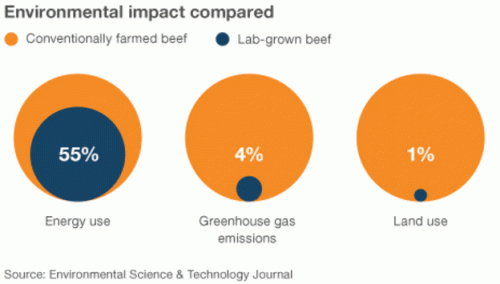
The cost of a synthetic burger is already only $11.3, a reduction of 3,000,000%! regarding the cost of the first prototypes. This leads us to think of an exponential decrease in the price of synthetic meat creation, which could end up being zero, reaching the Foodgularity.
At aveandoesscience they do a very thorough study on the price trend of farmed meat. There we can see their exponential tendency.
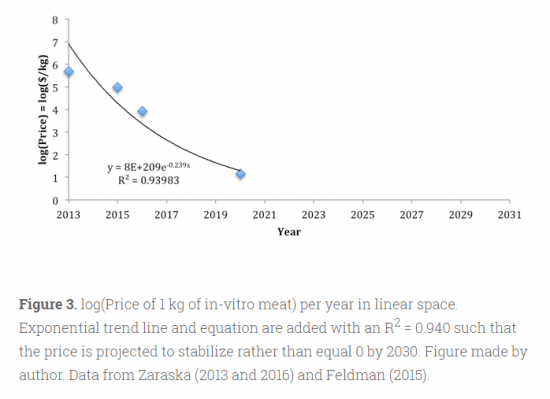
The economic, social and moral implications can be enormous. From eliminating harmful emissions to the atmosphere by mass livestock farming or allowing a higher consumption of protein to populations without economic resources to move to eliminate animal suffering.
It is not surprising that organizations such as PETA in 2008 offered a $1 million prize to the first company to make laboratory grown chicken meat available in 2012 or that the Dutch government has allocated $4 million to experiments on in vitro meat.
A possible roadmap outline to reach the Foodgularity can be seen below obtained from FutureTimeline.
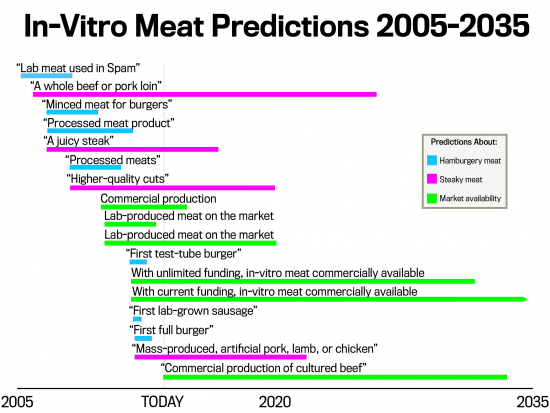
Finally, here is Mark Post's masterly talk "The meat revolution", creator of the first experiments in the World Economic Forum.
Aeroponic and hydroponic farms
Derived from hydroponic technology, the aeroponic cultivation system uses vaporized humidity to achieve more productive harvests on recyclable fabrics, inside, with the help of LED lighting and reduced water consumption. It is the solution for obtaining fresh vegetables all year round and has already been implemented in several cities, including the desert. That is to say, to cultivate without land or water.
Nanotechnology
Perhaps it is something more long-term that I have already commented on in my article on Will long term tangible assets be worth anything? Precious stones, petroleum, gold, jewellery: When nanofactories can create any product using atoms obtained from air or water... What is the point of a diamond?
Can we create food by building from their atoms? I leave you a video with the idea
This is very informative, especially about the future of our consumption of foods. I think I'll only stick to eating organic foods though.
Excelent post. Could be any difference really between artificial and natural food?. Really is the same as it is been cultivated.
Congratulations @gonzalo.ruiz! You have completed some achievement on Steemit and have been rewarded with new badge(s) :
Click on any badge to view your own Board of Honor on SteemitBoard.
For more information about SteemitBoard, click here
If you no longer want to receive notifications, reply to this comment with the word
STOP